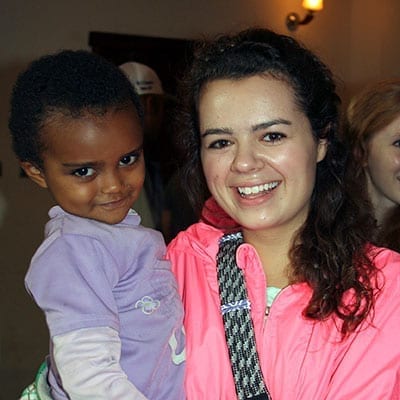Today was our first full day in Addis Ababa. It was quite the day (and it felt like 5 because we crammed so much into it). We started the day with prayer and devotion before eating breakfast bright and early at 7 a.m. We all went to the daycare this morning and were greeted by the most well-behaved 2-4-year olds I have ever seen. They sang us songs in English and welcomed us to their classrooms. We helped feed them breakfast after we were welcomed. The feeding process is slightly different than in the U.S. We sat in a circle with the children and had a plate of bread and jam in the center. The daycare workers showed us how to take a piece of bread, dip it in the jam, and then place it in a child’s mouth like a mama bird would feed her babies. After breakfast, a circle of 2-year-olds sat outside the room, each on a toilet, and went to the bathroom together. Yes, 2 year olds are potty-trained, and it was hilarious to watch. Adera is clearly doing something right with these children!! After breakfast, we split into groups and went to various schools in Addis Ababa. My group spent the morning at Hibur, the first through eighth grade school. We went into two separate classrooms, first with eighth graders and then with sixth and seventh graders, and played telephone and hangman. The students loved practicing their English with us and even tried to help us learn a few words in Amharic. I don’t think we have quite mastered that language yet, according to the classroom’s bursts of laughter every time one of us would attempt to pronounce a word. After the class visits, we helped prepare and feed the 200 students in the Adera feeding program at the school. The cooks showed us how to prepare the injera, a typical Ethiopian food made from a traditional grain, and even let us practice pouring the batter out to be baked. It was much harder than they made it look; I’m not sure they even wanted to serve the ones we did, but we got an A for effort! We played outside and talked with the students after lunch. These interactions were the first time that the language barrier really hit me hard. After three mission trips to Panama, I kept wanting to pull out my Spanish to communicate, but obviously, that wouldn’t have been very effective. In the classrooms, we had used translators, but out in the field on our own, we had very few ways to communicate verbally. However, we still had amazing connections with the kids and were able to excite them by taking lots of pictures and letting them see themselves on the cameras. When they went back to their classes, we rode back to the daycare to eat our lunch and interview some of the moms in the Adera program about themselves, their children, and the challenges they face in their own communities. It was very interesting to hear their stories, and some were much harder to listen to than others. One in particular really sparked everyone’s emotions, but thankfully, God stepped in to provide the hope in her life that she desperately needed today. It is amazing to see how He is at work all over the world, and we all feel so grateful to be voices for His light here in Africa. After the interviews, we went back to the grade school to play games with the students in ELIC club, an after-school student program to help the kids practice learning

English. We had so much fun singing songs and playing games together. We even taught them the Riff Ram Bah Zoo TCU cheer and showed them how to throw the “go frogs!” Dinner was at what Julie described as the “Pinterest of Ethiopia.” The restaurant we went to had newspaper articles from all around the world on the booths and in the bathroom stalls. It was definitely a melting pot of cultures, especially considering that we all ate hamburgers and French fries. We finally made it back around 7 p.m. and enjoyed some restful preparation for tomorrow and group bonding time. There were a few key takeaways from today’s experiences. The first one is that likes and dislikes are a luxury that we almost always overlook. We fed the students a large piece of bread filled with beets, onions, and tomatoes for lunch. A few of us were saying that we would never eat something that looked like that at home, but as we watched the students devour the sandwiches as large as their heads, we realized that in many communities throughout the world, deciding what you feel like eating that day doesn’t exist. They eat what they are handed and enjoy it because many times it may be the only nourishment they receive. Secondly, happiness exudes from these children. They are so innocent and excited, and you can’t help but smile when you see their beautiful eyes and bright, smiling faces each day. Finally, there is no possible way to fix all of the problems a community or a country may face. Delaney and I were sitting in bed talking tonight about how disheartening it is to realize that while Adera is doing incredible work in this community, there is still so much that needs to be done. However, Julie’s motto is that helping one life is enough. So while it may be hard to be here and realize that we cannot fix everything in these people’s lives, we must acknowledge that helping just one person is truly changing the world. Development is a very slow process, but it is how real change can occur. Today was emotionally and physically exhausting but worth every minute. Tomorrow we’ll be back in our groups at different schools, and I’m excited to see what the next day will bring!
Powered by WPeMatico





